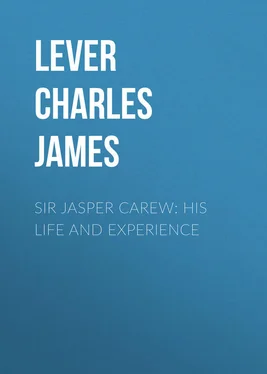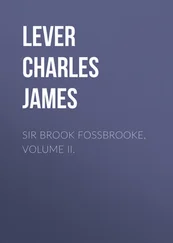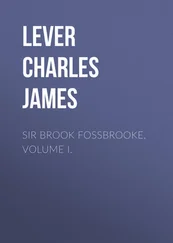Charles Lever - Sir Jasper Carew - His Life and Experience
Здесь есть возможность читать онлайн «Charles Lever - Sir Jasper Carew - His Life and Experience» — ознакомительный отрывок электронной книги совершенно бесплатно, а после прочтения отрывка купить полную версию. В некоторых случаях можно слушать аудио, скачать через торрент в формате fb2 и присутствует краткое содержание. Жанр: literature_19, foreign_antique, foreign_prose, на английском языке. Описание произведения, (предисловие) а так же отзывы посетителей доступны на портале библиотеки ЛибКат.
- Название:Sir Jasper Carew: His Life and Experience
- Автор:
- Жанр:
- Год:неизвестен
- ISBN:нет данных
- Рейтинг книги:5 / 5. Голосов: 1
-
Избранное:Добавить в избранное
- Отзывы:
-
Ваша оценка:
- 100
- 1
- 2
- 3
- 4
- 5
Sir Jasper Carew: His Life and Experience: краткое содержание, описание и аннотация
Предлагаем к чтению аннотацию, описание, краткое содержание или предисловие (зависит от того, что написал сам автор книги «Sir Jasper Carew: His Life and Experience»). Если вы не нашли необходимую информацию о книге — напишите в комментариях, мы постараемся отыскать её.
Sir Jasper Carew: His Life and Experience — читать онлайн ознакомительный отрывок
Ниже представлен текст книги, разбитый по страницам. Система сохранения места последней прочитанной страницы, позволяет с удобством читать онлайн бесплатно книгу «Sir Jasper Carew: His Life and Experience», без необходимости каждый раз заново искать на чём Вы остановились. Поставьте закладку, и сможете в любой момент перейти на страницу, на которой закончили чтение.
Интервал:
Закладка:
The Duke of Portland was well calculated to carry out a policy of this kind; but I am far from suspecting that he was himself fully aware of the drama in which he acted. He was a plain, straightforward man, of average good sense, but more than average firmness and determination. He came over to Ireland thoroughly impressed with the favorite English maxim that whatever Irishmen wish is assuredly bad for them, and thought, like the old physicians of the sixteenth century, that a patient’s benefit was in the exact proportion to his repugnance for the remedy. I am not quite sure that this pleasant theory is not even yet the favorite one as regards Ireland, which, perhaps, after all, might be permitted the privilege so generally accorded to the incurable, to take a little medicine of her own prescribing. Be this as it may, I am convinced that the Duke of Portland was no hypocrite, but firmly believed in the efficacy of the system he advocated, and only made use of the blandishments and hospitalities of his station to facilitate connections which he trusted would at last be concurred in on the unerring grounds of reason and judgment. Whatever people may say or think to the contrary, hypocrisy – that is, a really well-sustained and long-maintained hypocrisy – is one of the rarest things to be met with, and might even be suspected never to exist at all, since the qualities and gifts necessary, or indeed indispensable, to its attainment are exactly of an order which bespeaks some of the first and greatest traits of human nature, and for that reason would make the game of dissimulation impossible; and I would be as slow to believe that a man could search the heart, study the passions, weigh the motives, and balance the impulses of his fellow-men, for mere purposes of trick or deception, as that a doctor would devote years of toil and labor in his art for the sole aim of poisoning and destroying his patients.
Few men out of the lists of party took so great an interest in the great struggle as Tony Fagan. With the success of the patriotic side his own ambitions were intimately involved. It was not the section of great wealth, and there was no saying to what eminence a man of his affluence might attain amongst them. He not only kept a registry of all the members, with their peculiar leanings and party connections annexed to it, but he carefully noted down any circumstance likely to influence the vote or sway the motives of the principal leaders of the people. His sources of information were considerable, and penetrated every class of society, from the high world of Dublin down to the lowest resorts of the rabble. The needy gentleman, hard pressed for resources, found his dealings with the Grinder wonderfully facilitated by any little communication of backstairs doings at the Castle, or the secrets of the chief secretary’s office; while the humble ballad-singer of the streets, or the ragged newsman, were equally certain of a “tester,” could they only supply some passing incident that bore upon the relations of party.
If not one of the most brilliant, certainly one of the most assiduous of Fagan’s emissaries was a certain Samuel Cotterell, – a man who held the high and responsible dignity of state trumpeter in the Irish Court. He was a large, fine-looking, though somewhat over-corpulent, personage, with a most imposing dignity of air, and a calm self-possession of manner that well became his functions. Perhaps this was natural to him; but some of it may well be attributed to his sense of the dignity of one who only appeared in public on the very greatest occasions, and was himself the herald of a splendid ceremonial.
From long association with the Viceregal Court, he had grown to believe himself a part, and by no means an insignificant part, of the Government, and spoke of himself as of one mysteriously but intimately mixed up in all the acts of the State. The pretentious absurdity, the overweening vanity of the man, which afforded so much amusement to others, gave no pleasure to Fagan, – they rather vexed and irritated him; but these were feelings that he cautiously concealed, for he well knew the touchy and irritable nature of the man, and that whatever little information could be derived from him was only come-at-able by indulging his vein of self-esteem.
It had been for years his custom to pay a visit to Fagan on the eve of any great solemnity, and he was snugly installed in the little bow-window on the evening of the 26th May, with a goodly array of glasses and a very formidable square decanter of whiskey on a table in front of him. Fagan, who never could trust to the indiscreet propensity of Polly to “quizz” his distinguished friend, had sent her to spend the day in the country with some acquaintances; Raper was deep in a difficult passage of Richter, in his own chamber; so that the Grinder was free to communicate with the great official unmolested and undisturbed.
Most men carry into private life some little trait or habit of their professional career. The lawyer is apt to be pert, interrogative, and dictatorial; the doctor generally distils the tiresomeness of the patient in his own conversation; the soldier is proverbially pipeclay; and so perhaps we may forgive our friend Cotterell if his voice, in speaking, seemed to emulate the proud notes of his favorite instrument, while his utterance came in short, broken, abrupt bursts, – faint, but faithful, imitations of his brazen performances in public. He was naturally not given to talking, so that it is more than probable the habit of staccato was in itself a great relief to him.
I will not pretend to say that Fagan’s patience was not sorely tried as well by the matter as the manner of his friend. His pursuit of politics was, indeed, under the greatest of difficulties; but he labored on, and, like some patient gold-seeker, was satisfied to wash the sand for hours, rewarded with even a few grains of the precious metal at the end of his toil.
“Help yourself, Sam. That’s the poteen, – this, here, is Kinahan,” said the Grinder, who well knew that until the finish of the third tumbler, Mr. Cotterell’s oracle gave no sound. “Help yourself, and remember you ‘ll have a fatiguing day to-morrow!”
“A great day, – say rather a great day for Ireland,” tolled out the trumpeter.
“That’s to be seen,” replied Fagan, caustically. “I have witnessed a good many of those great days for Ireland, but I ‘d be sorely puzzled to say what has come of them.”
“There are three great days for Ireland every year. There’s the opening, one; the King’s, two; St. Patrick’s, three – ”
“I know all that,” muttered Tony, discontentedly.
“St. Patrick’s, three; and a collar day!” repeated Sam, solemnly.
“Collars, and curs to wear them,” growled out Tony, under his breath.
“Ay, a collar day!” and he raised his eyes with a half devotional expression at these imposing words.
“The Duke will open Parliament in person?” asked Fagan, as a kind of suggestive hint, which chanced to turn the talk.
“So we mean, sir, – we have always done so. Procession to form in the Upper Castle Yard at twelve; battle-axes in full dress; Ulster in his tabard!”
“Yes, yes; I have seen it over and over again,” sighed Fagan, wearily.
“Sounds of trumpet in the court – flourish!”
“Flourish, indeed!” sighed Tony; “it’s the only thing does flourish in poor Ireland. Tell me, Sam, has the Court been brilliant lately?”
“We gave two dinners last week – plain dress – bags and swords!”
“And who were the company?”
“Loftus, Lodge, and Morris, Skeffington, Langrishe, and others – Boyle Roche, the Usher-in-waiting. On Friday, we had Rowley, Charlemont – ”
“Lord Charlemont, – did he dine with the Viceroy on Friday last?”
Читать дальшеИнтервал:
Закладка:
Похожие книги на «Sir Jasper Carew: His Life and Experience»
Представляем Вашему вниманию похожие книги на «Sir Jasper Carew: His Life and Experience» списком для выбора. Мы отобрали схожую по названию и смыслу литературу в надежде предоставить читателям больше вариантов отыскать новые, интересные, ещё непрочитанные произведения.
Обсуждение, отзывы о книге «Sir Jasper Carew: His Life and Experience» и просто собственные мнения читателей. Оставьте ваши комментарии, напишите, что Вы думаете о произведении, его смысле или главных героях. Укажите что конкретно понравилось, а что нет, и почему Вы так считаете.











